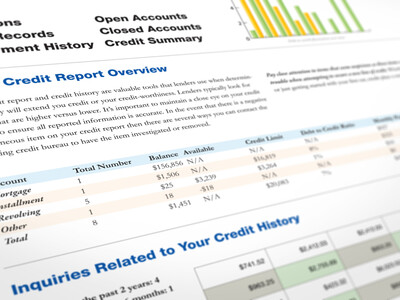
The 5 Building Blocks of a Credit Score
By John Beck
The numbers in your credit score can be thee key to getting a credit card, a vehicle and a home, so it's important to understand what factors go into having good credit.
What is a credit score?
A credit score is a measurement for how much credit you have and how reliable you're likely to be in paying your creditors on time. Your credit score will be between 300 and 850, the higher the better. If you pay your bills every month on time, your credit score will always be good, but people with a track record of paying off larger loans (like a mortgage) get a few points more than someone paying off a low-limit credit card.
It's simply a figure lenders use to help determine whether they are willing to offer you credit. They take a variety of factors into consideration when making that decision, but a credit score gives them a fast, fairly objective indication of your credit risk.
One of the most commonly used scores is the Fair, Isaac & Co., or FICO, score. This score is built from both the positive and the negative information found in your credit report.
FICO scores range from 300 to 850. The lower the score, the less likely you are to get competitive interest rates. The higher the score, the greater your chance to get lower rates. A higher score can therefore translate into significant savings.
The difference can be considerable, especially if you finance for a longer term. If you can save one percentage point on a $40,000 car loan, you'll save about $25 per month.
The three main US credit reporting agencies use slightly different versions of the FICO score. Each score, however, is based loosely on the same five building blocks of information:
1. Payment history: Accounts for roughly 35% of your score.
Since past behavior is often an indicator of future behavior, lenders like to see that you have a track record of paying bills on time. Payment history is one of the most important portions of your score, encompassing information from credit cards, installment loans, mortgage loans and more. Details on public record items such as bankruptcies, foreclosures, lawsuits, wage attachments, liens and judgments are included. Payment delinquencies—specifically, how many times you were late, how recently you were late, and how long you were late—also play a large role.
2. Amounts owed: Accounts for roughly 30% of your score.
"How much more credit can this individual handle?" That's the question this information helps lenders answer. Lenders consider outstanding credit card and installment loan balances as part of this assessment. Think about how much progress you've made on open-installment loans. How many of your accounts have balances? How close to the limits are your credit cards? These are points that help lenders see that you are not overextended and can responsibly handle additional credit.
3. Length of credit history: Accounts for roughly 15% of your score.
This building block factors in how long your accounts have been active and how long it's been since you used each one. It considers the age of your oldest account and your newest account, and then the average age of all of them. You can't rush credit history, but even if you're new to credit you can get a good score depending on the strength of the rest of the information in the credit report. For instance, timely payments on a few young accounts can help offset a short history.
4. New credit: Accounts for roughly 10% of your score.
Credit counselors often tell clients to go slowly when opening new credit accounts, and for good reason. Applying for lots of new credit in a short period of time is an easy way to negatively impact your score, especially if you have a limited credit history. This building block looks at how many new accounts you have, when you last opened one, how many recent requests you've made and how long it's been since a lender made an inquiry. On the positive side, this building block makes note of recent good credit behavior to help lessen the harm of payment problems in the past.
5. Types of credit in use: Accounts for roughly 10% of your score.
Generally considered the "credit mix" building block, this portion of your score looks at the variety of lending types you have used. It considers credit cards, retail accounts, mortgage loans, installment loans and finance company accounts. Of all the building blocks, this is the one that carries the least weight if the other four are solidly established. Don't open a new account just to improve your "mix."
What information is not used to build a credit score?
Now that you're familiar with the five building blocks of a credit score, it's equally as important to know the types of information the credit reporting agencies will NOT use to create your score:
- Income
- Education
- Marital status
- Job or length of time at your current job
- If you've been turned down for credit
- Length of time at your current address
- Whether you rent or own your home
- Information not mentioned in your credit report
Although your credit score will not be impacted by these items, a lender may look at them when assessing your loan application. A lender might consider your income, employment history, the type of credit you're applying for and a number of other factors, in addition to your credit score.
Keep in mind though, the credit reporting agencies and lenders will not consider your age, race or sex when building a credit score or deciding whether to approve your loan.
Next Steps
As with any aspect of credit, scoring is a personal issue based on your unique information and financial history. We suggest you work with one of the three main US credit reporting agencies to learn more about your credit score. Each agency offers an assortment of products and services that can help you do everything from understand your credit report to protect yourself from the dangers of identity theft.
